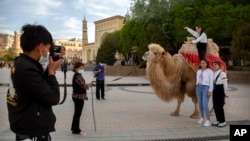Despite evidence of genocide and crimes against humanity in Xinjiang, major international travel companies are continuing to offer tours to the northwestern Chinese region, a new report found.
Those trips risk bolstering Beijing’s destruction and co-optation of Uyghur culture and reinforcing the propaganda narrative that all is well in the region, according to the report released Wednesday by the Washington-based Uyghur Human Rights Project (UHRP).
The report identifies at least seven travel companies that currently offer tours to the region China calls Xinjiang, which the report and many Uyghurs prefer to describe as East Turkistan.
Despite the well-documented abuses, companies like U.S.-based Abercrombie & Kent, U.K.-based Bamboo Travel and Canada-based Laurus Travel continue to offer trips to historic cities like Kashgar and Urumqi, the region’s capital.
Henryk Szadziewski, the report’s author, urges all travel companies to immediately stop offering tours to the region.
“By taking organized tours to the Uyghur Region, you really do run the risk of complicity with the genocide,” Szadziewski told VOA from Hawaii, where he is based.
“The optics of turning a profit while organizing tours to a region that has ongoing crimes against humanity and genocide are terrible,” said Szadziewski, who is also the UHRP’s research director.
Since the report was released, two companies — Canada-based Goway Travel and Australia-based Intrepid Travel — have said they would no longer offer tours to Xinjiang, according to the UHRP.
“Intrepid Travel has not operated this itinerary since 2019 and it has recently been removed,” company spokesperson Nicole Powell told VOA in an emailed statement.
The United States and several other countries have accused Beijing of committing widespread human rights abuses — including genocide and crimes against humanity — against Uyghurs and other majority-Muslim ethnic groups in Xinjiang. A 2022 report from the U.N. human rights office determined that abuses in the region may constitute crimes against humanity.
Travel companies respond
Of the tour companies mentioned in the report, U.K.-based company Wild Frontiers said in a statement to VOA, “We do not believe that travelling to a destination represents an endorsement of government policy.”
Wild Frontiers added that it has not operated tours to Xinjiang since 2019, and it will conduct an investigation into its tours to the region to ensure that potential future visits are “done as sensitively as possible.”
Tim Milner, director of Bamboo Travel, said, “whilst this report may advocate avoiding all travel to Xinjiang, this is not an approach we would currently consider,” in an email statement to VOA.
“Bamboo Travel does not support the Chinese Government in their suppression of the Uyghur people,” Milner also said, adding that Bamboo Travel has not operated tours in Xinjiang in five years.
Laurus Travel, Goway Travel and Amercrombie & Kent did not reply to VOA’s requests for comment.
Xi Jinping’s Xinjiang Policy
In a statement emailed to VOA, the spokesperson for China’s Washington embassy rejected accusations of genocide and other human rights abuses in Xinjiang.
“The door to Xinjiang is always open. We welcome people with no bias from all countries to visit Xinjiang,” Liu Pengyu, the spokesperson, added.
In a speech during a surprise visit to Xinjiang just days before the release of the UHRP report, Chinese President Xi Jinping said a top priority should be maintaining social stability and that enhancing the rule of law can achieve that, according to state news agency Xinhua.
Xi also reportedly urged officials to “more deeply promote the Sinicization of Islam and effectively control illegal religious activities.” Most Uyghurs are Muslims.
Beijing regularly says its policies in the region are for counterterrorism purposes. In his speech in Xinjiang, Xi said, “the fight against terrorism and separatism should be integrated with law-based and constant work of maintaining stability,” Xinhua reported.
Xi was also quoted saying he encourages domestic and overseas tourists to visit Xinjiang, where the region’s doors will be opened more widely for them.
Uyghurs’ reality in Xinjiang
Policing Uyghurs’ movements has become a fundamental component of the Chinese government’s policy in the region.
“They don’t have any space to breathe,” said Zubayra Shamseden, a Uyghur exile who works at the UHRP. Shamseden pointed to the irony that Uyghurs’ movements in Xinjiang are tightly controlled but travel companies continue to offer tours to the region.
Xinhua also quoting Xi talked about “the importance of strengthening the protection and use of cultural relics and heritage.” But that rings hollow for exiled Uyghurs, who accuse Chinese officials of cultural destruction.
They say the government has outlawed huge swathes of Uyghur culture while allowing other elements that are deemed unthreatening to be turned into tourist attractions.
“What the Chinese state has left of public expressions of Uyghur identity has remained for commodification and exploitation,” Szadziewski wrote in the report.
These tours reinforce Beijing’s stereotypical presentation of Uyghurs as an “exotic” people who like to sing and dance, he said. Through these tours, “you really are supporting what the Chinese government has presented to you as a picture of Uyghur-ness,” Szadziewski added.
The companies also advertise opportunities to visit Uyghurs’ homes, which Szadziewski finds disturbing and called a violation of privacy and a continuation of the government’s surveillance programs. There has not been any evidence that Uyghurs receive any financial benefit from the tourism, he added.
These kinds of tours also buttress Beijing’s propaganda narrative that everything is all right in Xinjiang, Shamseden said. “Xi Jinping is trying to normalize the genocide,” she said. “They’re normalizing repression.”
As a Uyghur, Shamseden said it is particularly painful to watch the travel companies offer visits to the region while she and other Uyghurs are unable to return to their homeland or even speak with family and friends still there.
“They’re trading human rights for money,” she said. “The Uyghurs became a toy for them — an exhibit.”





